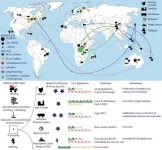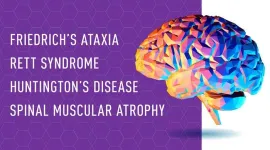(Press-News.org) Drinking beetroot juice every day for six months after having a stent fitted reduced the chance of angina patients having a heart attack or needing a repeat procedure, according to new research presented at the British Cardiovascular Society conference.
The finding on the benefits of the vegetable juice comes from a trial funded by the National Institute for Health and Care Research and the British Heart Foundation (BHF), presented at the conference in Manchester.
The researchers, based at St Bartholomew’s Hospital and Queen Mary University in London, found that 16 per cent of angina patients had a serious heart or circulatory incident, like a heart attack or need for another procedure, in the two years after having a stent fitted. However, when patients had beetroot juice daily, this dropped to 7.5 per cent.
Thousands of coronary heart disease patients each year in the UK have a stent implanted to widen one of the blood vessels in their heart and ease their angina, in a procedure known as a percutaneous coronary intervention (PCI).
Around 10 per cent of patients experience restenosis, where the stented blood vessel narrows again and heart disease symptoms return, within five years of a PCI. By advising that patients drink beetroot juice, doctors could soon reduce the chance that the stent fails in this way.
When the blood vessel width of patients was measured six months after stenting, the vessels of those who had beetroot juice showed around half as much narrowing in that time as those who had the placebo treatment.
By stopping restenosis, beetroot juice could stop patients from having to have another PCI procedure that may also fail or a much more invasive coronary bypass surgery.
Dr Krishnaraj Rathod, Clinical Senior Lecturer at the William Harvey Research Institute, QMUL, who led the trial, said:
“Experiments in the lab suggested that the inorganic nitrate, which is found naturally in beetroot juice, would have these effects, and it is very encouraging to see it create such a big improvement in the clinic for angina patients. Our patients liked that their treatment was a completely natural product that has no significant side effects.
“We will now take this to the next stage of trials in the hope that doctors can soon prescribe beetroot juice to ensure stents last longer to provide even more effective relief of symptoms.”
Professor James Leiper, Associate Medical Director at the British Heart Foundation, said:
“Stenting is one of the most crucial tools we have in the fight against coronary heart disease but work still needs to be done to ensure that every patient sees a long-term benefit from the procedure.
“Thousands of patients each year have to go through the stress of a medical procedure on their heart more than once before it is successful. This small study offers hope that this can be prevented. The trial must now be scaled-up to confirm the initial observation that beetroot juice can make a difference.”
The researchers were able to show that beetroot juice helps patients thanks to its natural high level of inorganic nitrate. Patients in the trial that had beetroot juice with inorganic nitrate removed did not get the same beneficial effects.
Inorganic nitrate is a nutrient that gets converted to nitrite by naturally found bacteria in the mouth, which is then turned into the signalling molecule nitric oxide (NO) by enzymes in the body. It is thought that NO is the cause of the positive effects on patients’ blood vessels.
Beetroot juice was shown to be a safe and reliable way to get inorganic nitrate into the body, with no significant side effects experienced by any of the 300 patients on the trial other than pink urine.
The team are now looking to start a larger trial soon. They are hoping that, if successful, beetroot juice can be prescribed as a treatment to be taken after stent implantation. This may then extend beyond angina patients to those who have had a stent for a different reason, like after a heart attack.
END
Daily beetroot juice reduces rate of repeat procedures and heart attacks in angina patients with stents
2023-06-07
ELSE PRESS RELEASES FROM THIS DATE:
Knowledge coproduction: Working together to solve a complex conservation problem
2023-06-07
A new publication from a team of scientists at USGS, Point Blue Conservation Science, and Conservation Biology Institute shows how knowledge coproduction - the collaborative creation of actionable information by scientists, resource managers, and policy makers - can help identify viable conservation options for a dynamic ecosystem with a complex web of stressors.
The wetland habitats of California’s Central Valley support millions of migratory birds each year and are an important part of the Pacific Flyway, a bird migration route that ...
UW research shows real-world value of strategy courses for MBA students
2023-06-07
More than 100,000 Master of Business Administration students graduate each year in the United States, and all of them take at least one strategy course. Even so, little is known about the effects of the degree’s most popular course offering.
Strategy courses typically focus on frameworks and cases that develop decision-making abilities for eventual MBA graduates, who make up most associates and partners at leading consulting firms, as well as 40% of the chief executive officers of publicly traded firms in the U.S. A new University of Washington study, published online June 5 ...
Measuring greenhouse gas from ponds improves climate predictions
2023-06-06
ITHACA, N.Y. – Shallow lakes and ponds emit significant amounts of greenhouse gases into the atmosphere, but emissions from these systems vary considerably and are not well understood.
Now, a new Cornell University-led study measures methane and carbon dioxide emissions from 30 small lakes and ponds (one acre or less) in temperate areas of Europe and North America, revealing that the smallest and shallowest bodies of water exhibit the greatest variability over time.
The paper marks an important step toward calibrating climate models so they better predict emissions from inland waterbodies, and it points to the need to study small waterbodies more closely.
“This ...
Cobalt mineralogy at the Iron Creek deposit, Idaho cobalt belt, USA: Implications for domestic critical mineral production
2023-06-06
Contributed by Laura Fattaruso, GSA Science Communication Fellow
Boulder, Colo., USA: A new study published in Geology evaluates the potential for cobalt extraction from the Idaho Cobalt Belt (ICB) of east-central Idaho, using a detailed study of the Iron Creek deposit. The ICB hosts the second largest known domestic resource of the critical mineral cobalt, one of the key ingredients in many rechargeable batteries needed for the green energy transition. Demand for cobalt is projected to increase more than 500% by 2050. Roughly 70% of the cobalt mined globally is from the Democratic Republic of the Congo, where mining practices have been criticized for human rights violations including ...
Predictive models show wildlife managers where to find destructive feral swine
2023-06-06
UNIVERSITY PARK, Pa. — Feral swine are considered one of the top invasive species of concern in North America because of the damage they do to agricultural and natural systems. To best manage them, resource management agencies need to know more precisely where and when to implement control methods. A new study by a Penn State-led research team developed a method to help guide control efforts in the Great Smoky Mountains National Park.
Descended from wild European boars imported centuries ago that bred with escaped domestic pigs, feral swine cause widespread damage to ecosystems by wallowing ...
Revolutionizing optical control with topological edge states
2023-06-06
Nanophotonics and topology have gained significant interest due to the unique properties they offer. One area of focus is the investigation of topological edge states (TESs). These states have captured widespread attention because they are very resistant to errors and imperfections. Arising from topologically nontrivial phases, TESs provide a powerful toolkit for the architectural design of photonic integrated circuits. TES transport has led to the discovery of various intriguing optical effects and applications, including directional couplers, one-way waveguides, mode-locked waveguides, ...
Research to develop new rare disease therapies underway at The Jackson Laboratory
2023-06-06
Researchers led by Cathleen Lutz, Ph.D., are using an exciting new method, preclinical genomic editing, to develop safe, effective therapies for rare diseases and bring them to the clinic.
Unfortunately, the translation of the accumulated knowledge to safe and effective therapies has lagged. There are many reasons to predict that the situation is changing for the better, however, as powerful new gene-based therapies succeed in clinical trials and receive FDA approval.
Therapeutic strategies such as gene replacement and gene modulation (e.g., blocking protein production with anti-sense oligonucleotides) are at the forefront of the recent progress. ...
Elizabeth Anderson and Alondra Nelson win 2023 Sage-CASBS Award
2023-06-06
Sage and the Center for Advanced Study in the Behavioral Sciences (CASBS) at Stanford University are pleased to announce Elizabeth Anderson and Alondra Nelson as winners of the 2023 Sage-CASBS Award.
Established in 2013, the Sage-CASBS Award recognizes outstanding achievement in the behavioral and social sciences that advances our understanding of pressing social issues. It underscores the role of the social and behavioral sciences in enriching and enhancing public discourse and good governance. Past winners of the award include Daniel Kahneman, psychologist and Nobel laureate in economic sciences; Pedro ...
Study: Doing good for others is good for children’s and teens’ mental, physical health
2023-06-06
Children and teenagers who volunteer tend to flourish mentally and physically, according to a new study from UTHealth Houston.
The study, led by Kevin Lanza, PhD, assistant professor of epidemiology, human genetics, and environmental sciences at UTHealth Houston School of Public Health, was published recently in JAMA Network Open.
Overall, the research team found that youths who had volunteered in the past year were in better physical health, had a more positive outlook on life, and were less likely to have anxiety, depression, or behavioral problems compared to their peers who did not volunteer.
“These study results bring optimism that youth volunteering could be ...
Health equity is the focus of LBGTQ+ Pride Month celebrations across the country
2023-06-06
DALLAS, June 6, 2023 — According to a study recently published in the Journal of the American Heart Association, lesbian and bisexual women in France had poorer heart health than heterosexual women, a finding that could be attributed to discrimination and other stressors faced by the LGBTQ+ community. In support of Pride Month, the American Heart Association, a global force for longer, healthier lives for all, is promoting awareness and health education for all people across the spectrum of diversity, including those who identify as LGBTQ+.
For more than 50 years, the LGBTQ+ community has spent the month of June ...



